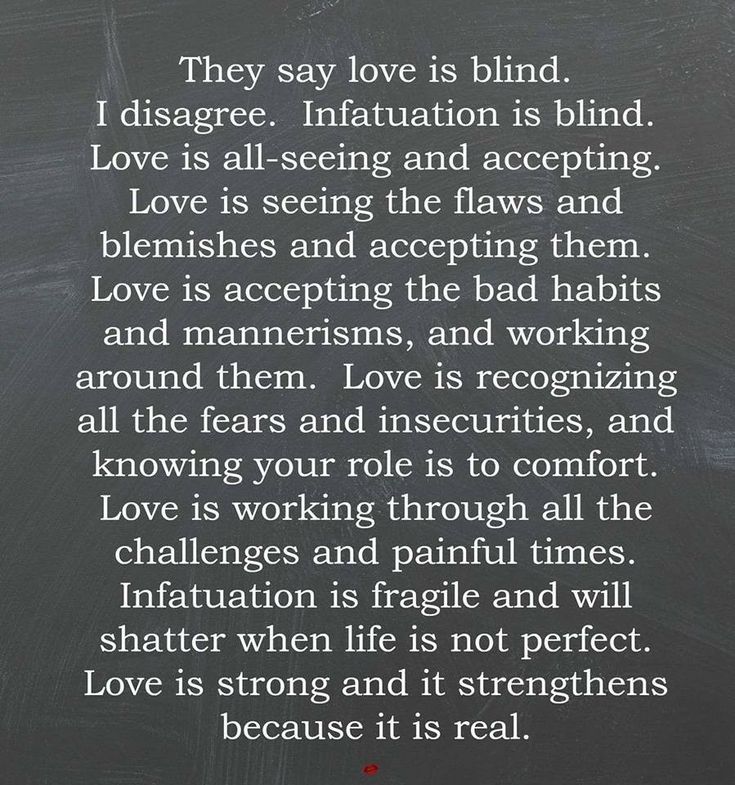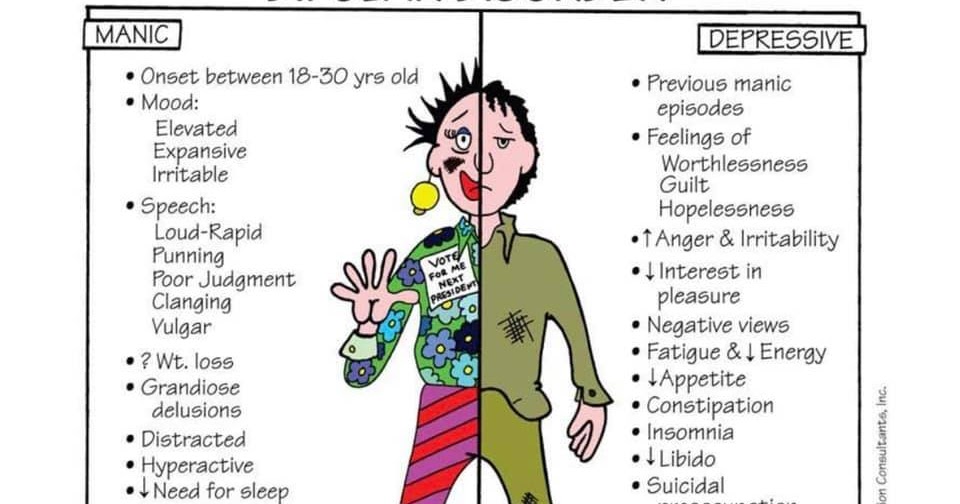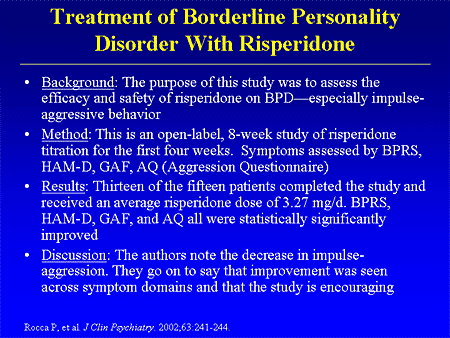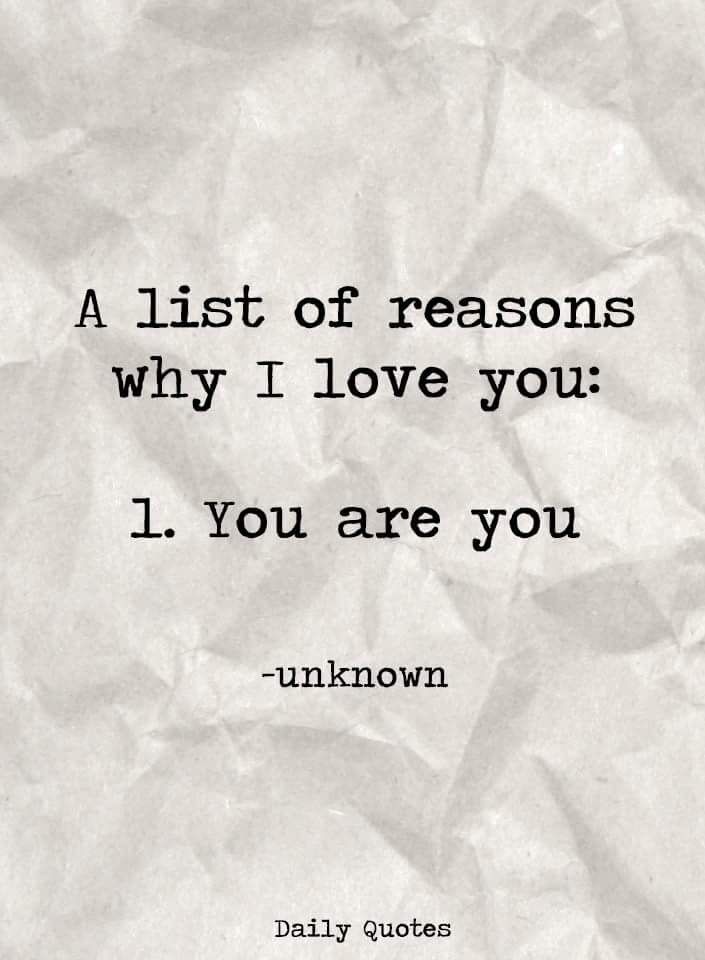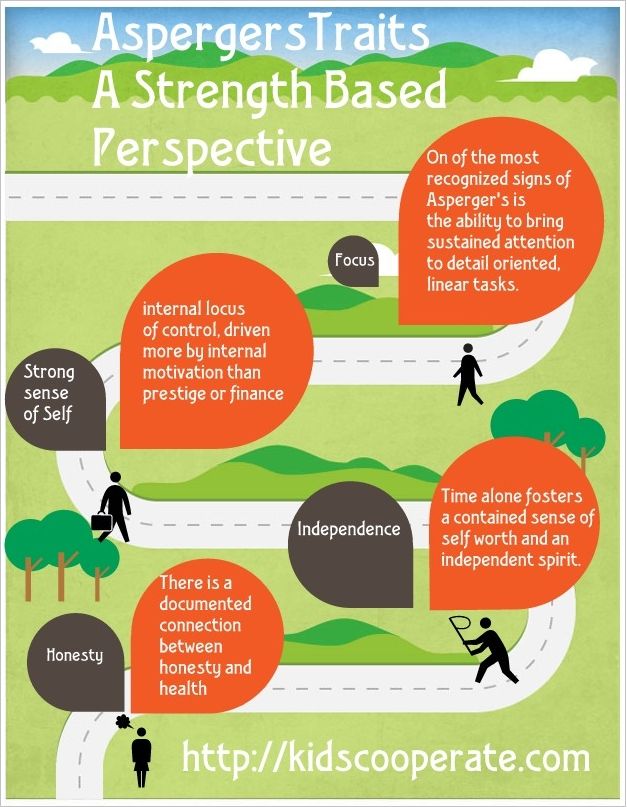Real love or infatuation
How to Tell the Difference
Ignoring relationship red flags and fantasizing about the perfect life with someone you just met may be signs of infatuation versus love.
Being swept off your feet or “head over heels” for someone new — despite not knowing them very well — is often referred to as infatuation.
Infatuation is also a deep sense of connection, mainly based on the idealization of someone else. It can feel intense, passionate, and beyond reason. Many may refer to it as love at first sight.
Love, on the other hand, may be less oblivious to another person’s shortcomings or incompatibilities. It exists despite those.
Love also looks to celebrate differences and build a connection that allows both people to thrive as individuals. It may require intentional work and effort from each partner to come together in disagreement to work toward a mutual goal. Love is a choice.
The difference between infatuation versus love is often one of assumption versus reality.
“With infatuation, there’s usually a connection; you usually have at least one thing in common, but the high it creates for someone is based usually on a fantasy that we have created about the person, an idealized version of them,” explains Sarah Moore, a licensed professional counselor from Arlington, Virginia.
Here are other differences between love and infatuation:
Perfection vs. individuality
Infatuation can lead you to see someone as flawless or ideal, despite evidence of differences, says Dr. Dug Y. Lee, a board certified couple and family psychologist and professor from Bellevue, Washington.
Love, on the other hand, has identified and acknowledged differences as individuality, accepting the partner as a whole.
Lee explains infatuation might make you put a positive spin on undesirable characteristics instead of accepting them, for example, whereas love will be empathetic, kind, and looking to problem solve challenges without denial they exist.
In extreme situations, infatuation may lure you into an abusive relationship by blinding you to important red flags.
Craving vs. satisfaction
Moore says the feelings that come along with infatuation are often similar to a “high,” including:
- heightened arousal
- excessive laughter
- anticipation
- longing
This could lead you to engage in behaviors that may not be safe for you or others.
Love can also involve feelings of excitement about being with the other person; however, love typically allows for you to feel content in your relationship, free of constant craving for that other person or the anxiety that it may cause you the uncertainty of their feelings.
Assumptions vs. intimacy
“On a truly personal level, you don’t know the individual all that well,” Dr. Joann Mundin, a board certified psychiatrist from Sacramento, explains of infatuation. “Most of what you know about the individual is superficial, either on their looks or how they behave in a group.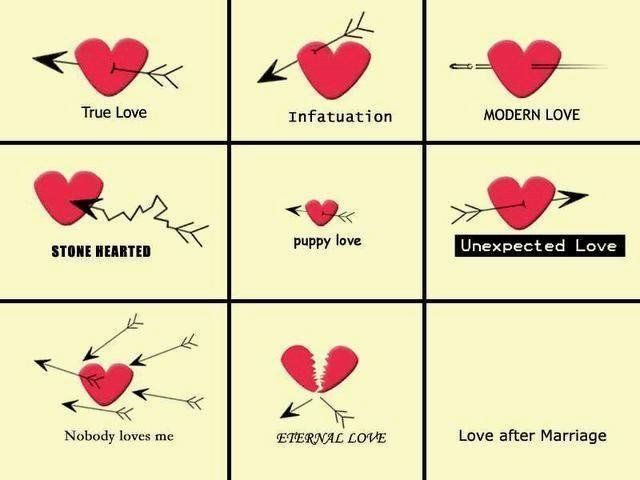 ”
”
Love involves a sense of real intimacy; knowing things about your partner other people aren’t privy to, witnessing vulnerability and emotional need, and being trusted with potentially hurtful information.
Planning the future vs. future planning
Mundin adds it’s also common for people experiencing infatuation to fantasize about the ideal future they may or could have with the other person.
These fantasies may involve vacations they’ll go on, children they’ll have, or achievements they’ll receive — all without input from the other person. Infatuation may even lead you to believe the other person is in love with you, without this being the case.
Love may take a more practical approach to the future. Couples in love often discuss career, marriage, and children goals together after feelings and the relationship have proven stable.
Is infatuation the first stage of love?
Infatuation can be the first stage of love, but not everyone experiences infatuation. You can meet someone wonderful without that love-at-first-sight rush.
You can meet someone wonderful without that love-at-first-sight rush.
Mundin emphasizes that infatuation can turn into love, but only if you’re willing to let go of the perfect fantasy and overcome any disappointment that brings.
“Infatuation is selfish because it makes you feel good to fantasize about the individual, but in truth, it’s likely that they aren’t as perfect as you believe,” she says. “Yes, it can develop into love if you are willing to compromise, give, and work things out with the person you are fascinated with.”
In other words, you may need to be disillusioned in order to truly fall in love.
Long-term commitments don’t usually survive on infatuation alone, but you may experience infatuation for years, depending on the circumstances.
“Usually, infatuation lasts for between 18 months and three years,” says Mundin. “Unless a long-distance relationship is involved or an extremely insecure individual is fascinated, infatuation rarely lasts longer. ”
”
The remnants of infatuation may help strengthen a relationship, however, according to Lee.
Through a continued process of maximizing your partner’s strengths over their weaknesses, you can maintain a sense of joy and excitement that isn’t ruled by fantasy.
Infatuation is often a fantasy-based, passionate longing for someone else. It can prevent you from acknowledging their weaknesses, and may even land you in an unhealthy situation.
Love is often based in reality and is fed on closeness and knowledge of the other person. You respect your partner’s differences, enjoy true intimacy, and work together as a team.
While infatuation can lead to love, it may require you to let go of the fantasy and embrace differences, shortcomings, and individuality.
Infatuation vs. Love: 19 Differences + Signs Of Each
What is infatuation?
Infatuation is a strong feeling of attraction, fascination, and fixation toward someone, often without actually knowing them that well.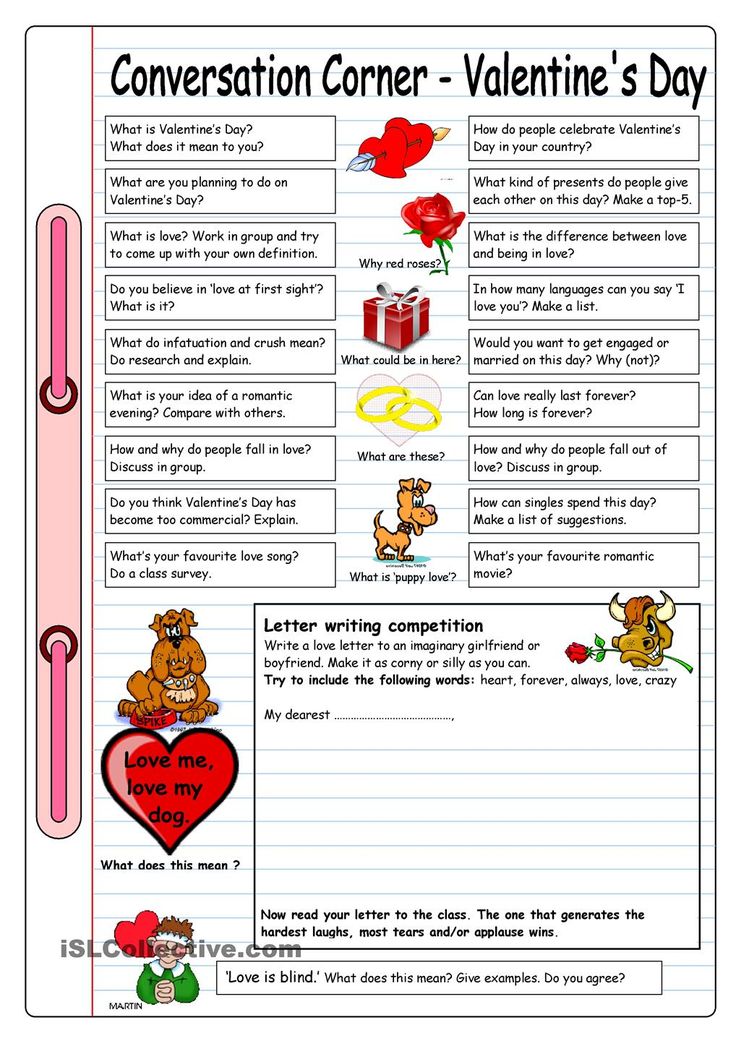 Although it often feels very intense, infatuation tends to be based more on physical attraction and an imagined fantasy about who this person is, according to Lauren Fogel Mersy, PsyD, psychologist and AASECT-certified sex therapist.
Although it often feels very intense, infatuation tends to be based more on physical attraction and an imagined fantasy about who this person is, according to Lauren Fogel Mersy, PsyD, psychologist and AASECT-certified sex therapist.
"When I think of infatuation, I think of someone who has a strong attraction to a person they don't know well," Fogel Mersy explains. 'It can also involve rejecting information that goes against the fantasy, such as ignoring red flags or early signs of incompatibility."
Someone who is infatuated is constantly thinking about that person, Fogel Mersy adds. The feeling tends to form very quickly after meeting someone, says licensed mental health counselor Grace Suh, LMHC, LPC, and the infatuated person may feel like they've found "the one" even though they've just met them.
Signs of infatuation:
- You're constantly thinking about this person.
- You haven't had that many real interactions or deep conversations with each other yet, yet you already have strong feelings for them.

- You feel like this person is basically perfect, or the "ideal" partner.
- You feel like this person is a "perfect match" for you.
- You feel vaguely "obsessed" with this person.
- You're very physically attracted to this person, and it can sometimes distract you from exploring other facets of this person.
- You don't know the person that well on an actual personal level.
- Most of what you know about the person is surface level, based on appearance, or based on their behavior in a group setting.
- Most of what you know about this person is the same stuff that any acquaintance might know about them.
- Most of what you know about the person is from hearsay or social media, not from actual conversations or experiences you've had with each other.
- You fantasize about this person, despite not knowing them on a personal level yet.
- You feel a little disappointed when the person doesn't meet your expectations, or you shrug it off as just a fluke.
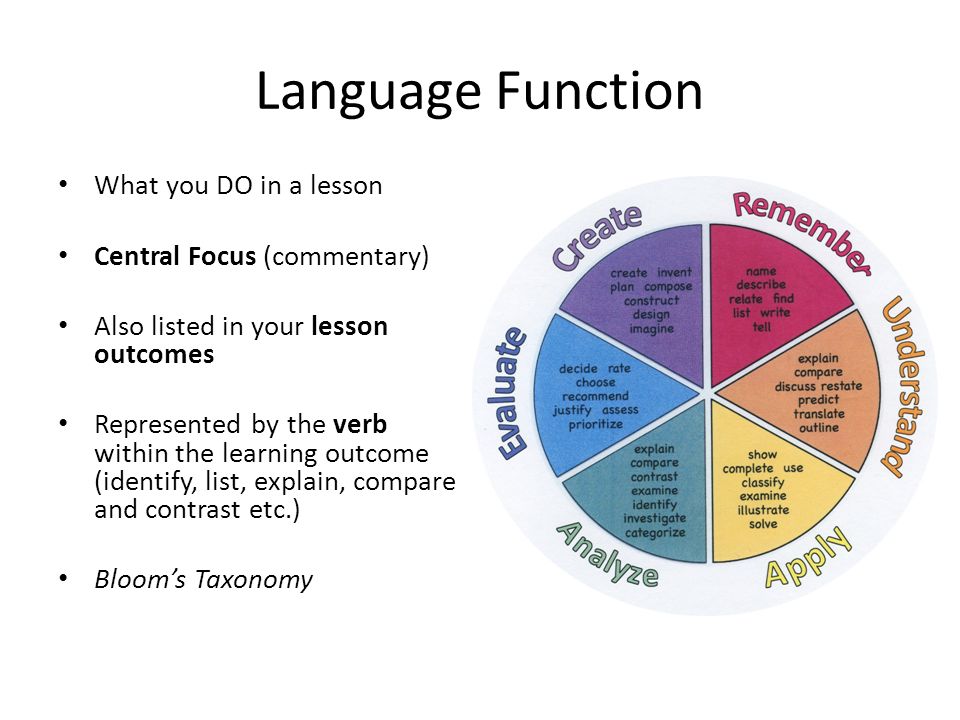
- You ignore early signs of incompatibility that go against your fantasy.
- You're very concerned about impressing this person and having them see you in a positive light.
- You are overjoyed by the idea of "having" this person or being "chosen" by them.
- You're forming strong feelings for this person very quickly—almost as if you knew instantly.
- Everything is moving super quickly, and you're hitting (or wanting to hit) relationship milestones as fast as possible.
Advertisement
This ad is displayed using third party content and we do not control its accessibility features.
Infatuation vs. love.
Whereas infatuation tends to happen very quickly and involves a strong attraction, love is a much deeper experience of knowing someone fully, feeling bonded and close to them, and caring about them in a way that's both enduring and not centered around how they make you feel.
"Love is more than just a feeling," Suh says. "It requires some knowledge about the person and being able to love despite knowing that their loved one is flawed and imperfect. Love is not self-serving but the willingness to sacrifice and/or compromise."
"It requires some knowledge about the person and being able to love despite knowing that their loved one is flawed and imperfect. Love is not self-serving but the willingness to sacrifice and/or compromise."
Fogel Mersy puts it this way: "Loving someone means knowing them. Love is a form of intimacy, and intimacy requires being known and seen."
Does infatuation turn into love?
Infatuation does not always turn into love—sometimes it stays that way until the relationship comes to a close, either because the object of infatuation fails to live up to the fantasy or because they don't reciprocate the feelings. That said, infatuation can turn into love sometimes.
"Infatuation may turn into love if you are able to accept the disappointment and willing to give rather than self-serve," Suh explains. "Infatuation is self-serving because you feel good fantasizing about the person, but the reality is that this person who you think is perfect is probably not perfect.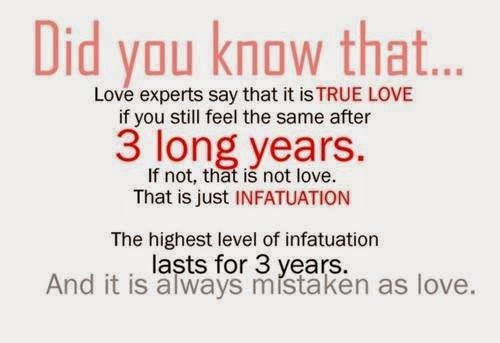 If you are able to give, sacrifice, and compromise with the person you are infatuated with [with] joy and willingness, yes, it can certainly turn into love."
If you are able to give, sacrifice, and compromise with the person you are infatuated with [with] joy and willingness, yes, it can certainly turn into love."
Advertisement
This ad is displayed using third party content and we do not control its accessibility features.
How long does infatuation last in a relationship?
Infatuation usually happens immediately after meeting someone for the first time, Suh explains. But there's not really a set amount of time that it lasts in every relationship. Infatuation is most distinct in the "honeymoon phase" of a relationship, which lasts a few weeks for some couples and a few months or even years for others.
Rather than thinking about how long the infatuation stage might be, Suh recommends considering how long it takes to progress to the next stage of the relationship. (Here's more on how long it takes to fall in love.)
Is infatuation a bad thing?
Infatuation is not necessarily a bad thing, according to Fogel Mersy.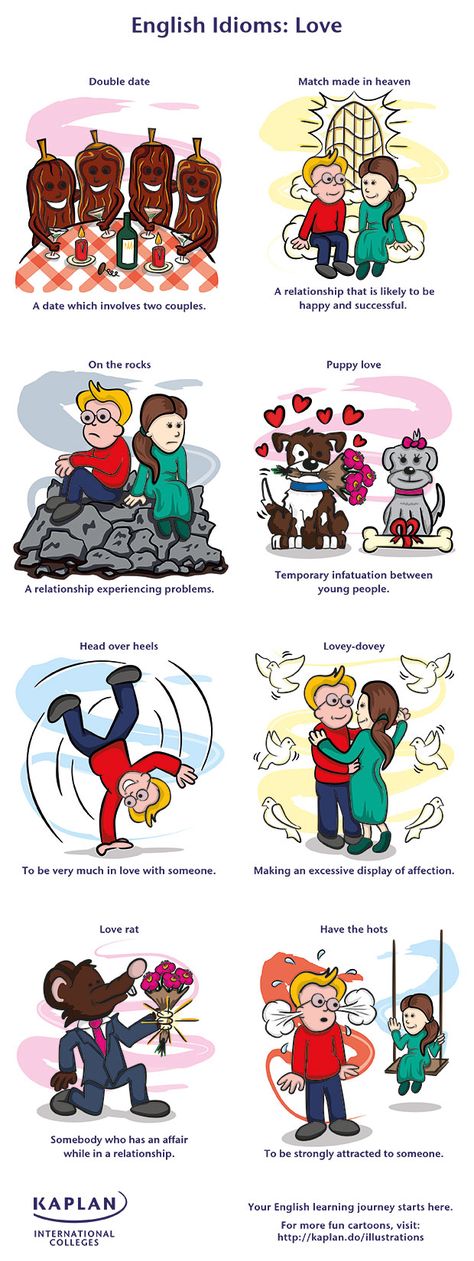 "It just requires getting to know someone more intimately for it to grow into love."
"It just requires getting to know someone more intimately for it to grow into love."
But infatuation can be unhealthy in extremes, Suh notes. "When you are infatuated, it probably means that you really like their appearance and [feel] sexually/physically attracted to them intensely. It is important to have sexual/physical attraction toward someone to develop a romantic relationship," she says. "But if infatuation becomes an obsession with unrealistic expectations and demanding perfection, yes, it becomes bad."
Advertisement
This ad is displayed using third party content and we do not control its accessibility features.
The bottom line.
Infatuation can be a normal part of the early stages of getting to know someone or of a new relationship. It feels very intense, which is why many people confuse infatuation with love (just like they do love and lust). Infatuation can also be present in the process of falling in love, and in healthy amounts, it's not necessarily a bad thing.
"If infatuation turns bidirectional, with the sense of security from both parties, you're off a good start," Suh says.
Just remember to take your time, really invest in getting to know the person you're with—flaws and all—and maybe wait until the rose-colored glasses come off before making any big decisions.
Advertisement
This ad is displayed using third party content and we do not control its accessibility features.
What if it's love? How to distinguish a real feeling from a "delusion" | Man and woman | Health
12149
"Arguments and Facts" in Belarus No. 7. The banner of sports. We open the diary of the Olympics. 13/02/2018Will have time to put on the ring. First you need to get to know each other. Photo from open sources
They say that the ability to determine the difference between passion and love can save you from a serious mistake, keep you from marrying a person with whom you will have to suffer rather than enjoy life. nine0005
nine0005
What's the difference? In his book "Sex, love or infatuation - how to define it?" Renowned psychologist, Dr. Ray SHORT gives some key tips to help a person explore their feelings. We present some of them. Attention! "Keys" should be considered comprehensively, not selectively.
What attracts
Hobbies: is most likely attracted by the physical characteristics of another person: a beautiful face and a good figure.
True love: is interested in the personality of the chosen one as a whole. Of course, there will also be physical attraction, but only along with many other attractive qualities.
What's inside
How many different qualities attract you in this person?
Passion: usually the number of such qualities is small: we go crazy with a smile or a sexy walk.
True love: likes all or most of the qualities in another person.
How did it start? nine0019
Passion: arises quickly.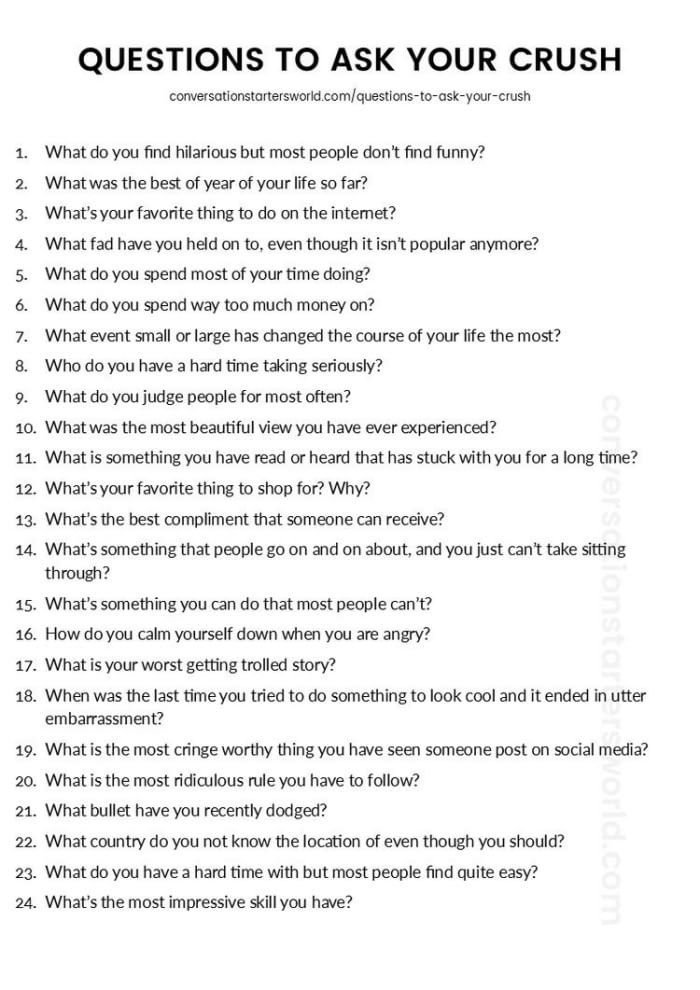 The so-called "love at first sight".
The so-called "love at first sight".
True love: appears slowly. First, getting to know the person.
How constant is the interest?
Passion: interest flashes brightly, then goes out.
True love: feelings rather warm and tender than fluctuating from ardent passion to cold indifference. Love grows slowly, but its roots are deep. nine0005
What's wrong with you?
How does feeling affect you?
Passion: has a disorganizing effect. Romantic feelings completely take over a person.
True love: the best qualities and the desire to become even better are manifested. And the work goes well, and life is beautiful.
People around
Passion: the whole universe revolves around one person. The rest of the relationships are out of the scope of interest. Even with family and friends. nine0005
True love: the lover is the most important person in the world, but relationships with family and friends do not lose their importance.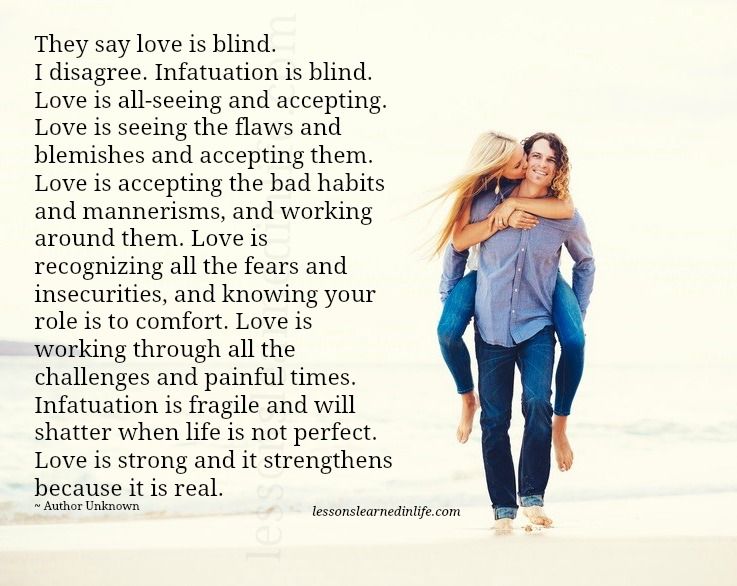
Looking from the outside
Passion: what others think of a partner is a very important test. It is likely that parents and many friends do not approve of this relationship.
True love: chances are high that parents and most friends approve of the choice.
Spat
Infatuation: when a person is infatuated, he often quarrels with the object of his feelings. And over time, quarrels become more frequent and serious. Discord, tears and romantic reconciliations only relieve boredom and hide the fact that there is nothing to talk about.
True love: you may have disagreements, but there is a desire to agree, and quarrels become less frequent and serious.
Who is with whom?
Passion: a person uses pronouns in his thoughts and speech: “I”, “me”, “mine”, “he”, “his” (or “she”, “her”). nine0005
True love: commonly used words: “we”, “our”, “us”.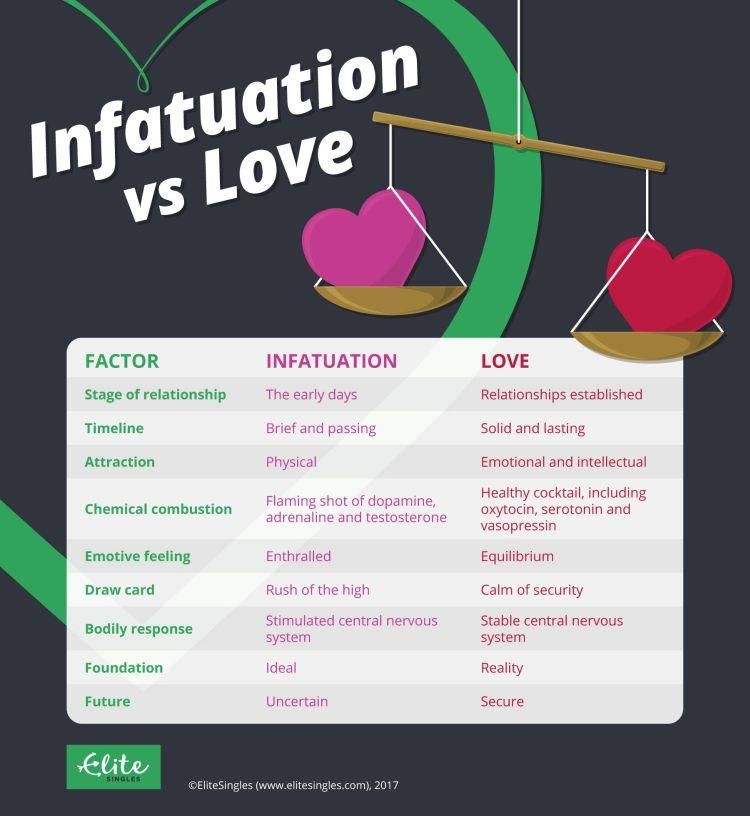
Selfishness and altruism
Hobbies: a guy can date a beautiful and noticeable girl just because it flatters his pride. A girl can keep a guy because his devotion raises her price in the eyes of others.
True love: people like him for who he is, and not because he can help assert himself. nine0005
What's in the base?
Passion: if the goal is to find a person who will devote his whole life to making you happy, if you care about yourself first of all, then this is a hobby.
True love: is primarily interested in what can be given, not received.
Irina PETRENKO
love relationshippsychologist's advice
Next article
You may also be interested in
- Why is the wife dissatisfied with everything after the wedding?
- What to do if everything goes wrong? nine0143 In the ashes of feelings.
- You won't see a century of money. Phrases that will make your child a beggar nine0144
- Poison love. What kind of relationships do not need to "build"
 How to deal with love burnout
How to deal with love burnout How to distinguish true love? 12 keys
There is no more popular topic on TV and movies than love. Soap operas are filled with "romantic love". This theme is also popular in songs. We are constantly haunted by the idea that love is the only thing that matters. nine0159
Grade
- 4.8 out of 5 possible based on 5 votes
Most people think about romantic love like this: "Love is an incomprehensible obsession that comes from nowhere and immediately completely takes possession of you like measles.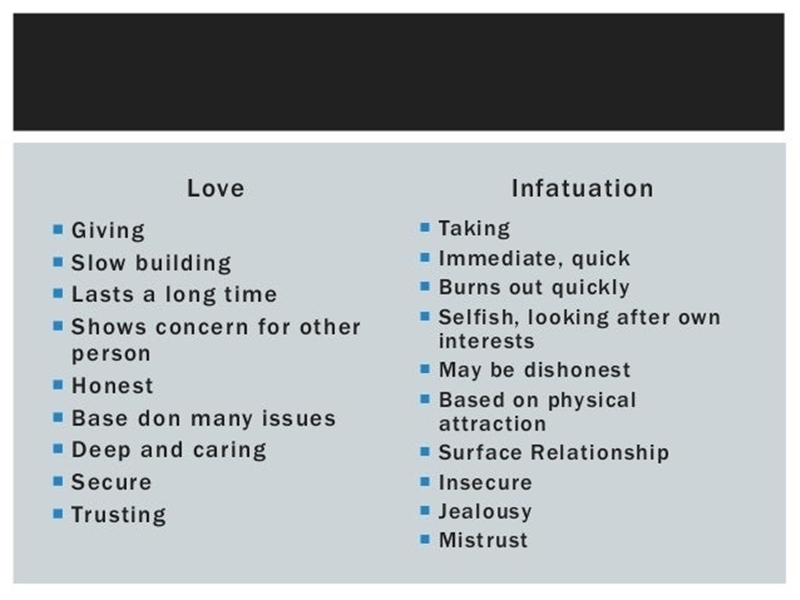 You recognize it intuitively. If it's real feeling, you won't have to guess for long. You'll see it, no doubt. Love is so important that you have to give up everything for it. It's forgivable for a man to leave his wife for love, for a woman to leave home and children, for a king - the throne. She comes completely unexpectedly. and there's nothing you can do about it. It's beyond the control of man." nine0159
You recognize it intuitively. If it's real feeling, you won't have to guess for long. You'll see it, no doubt. Love is so important that you have to give up everything for it. It's forgivable for a man to leave his wife for love, for a woman to leave home and children, for a king - the throne. She comes completely unexpectedly. and there's nothing you can do about it. It's beyond the control of man." nine0159
But this is NOT true love! True love is not like that.
Infatuation really comes suddenly and you can't do anything about it. But true love is devoted and selfless love. That's what she's based on. You may wonder why it is necessary to know the difference between infatuation and love? The reason is this: knowing the differences will save you from making a huge mistake. Every year, millions of sparkling-eyed couples come to church and solemnly swear to love each other for the rest of their lives. For some of them, marriage really becomes an invaluable asset.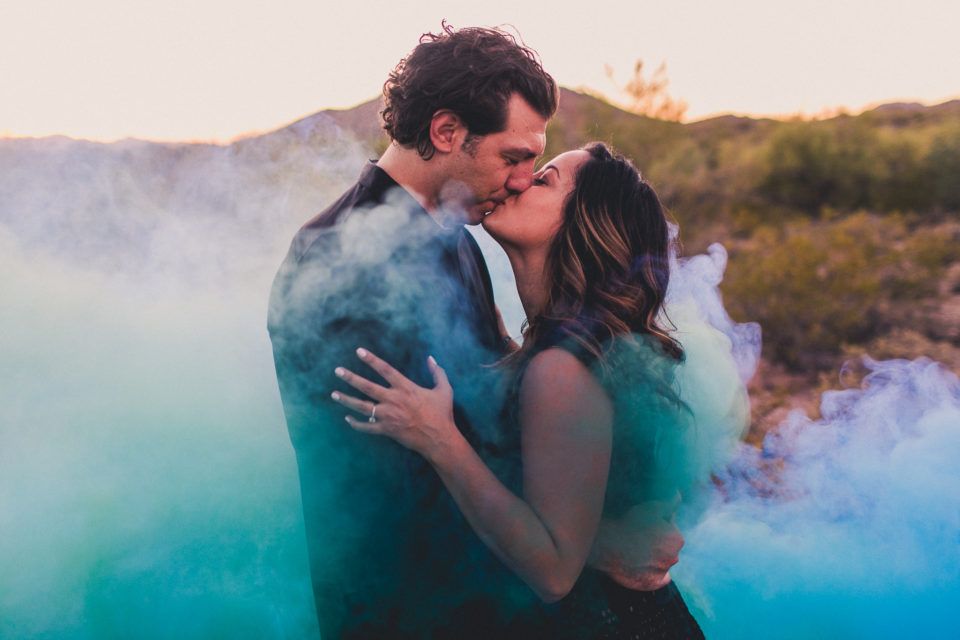 For others, he is simply tolerant. But for half of these couples, marriage becomes a real misfortune. After a short period of time, they begin to realize that they absolutely cannot stand living together. What's the matter? nine0005
For others, he is simply tolerant. But for half of these couples, marriage becomes a real misfortune. After a short period of time, they begin to realize that they absolutely cannot stand living together. What's the matter? nine0005
The difference is that some couples build their marriage on true love, and others on infatuation, which is false love. Such marriages do not last long.
How to understand the difference? During the Gold Rush, many miners thought they had hit a vein. But later, to their great disappointment, they found out that their find was not real gold, but the worthless mineral pyrite. Pyrite looks very similar to gold, but has no value. It is also called "fool's gold". nine0159
As we have already said, it is NOT easy to tell the difference between infatuation and true love. In his book "Sex, love or infatuation - how to define it?" Dr. Ray Short gives some key tips to help a person examine their feeling and determine whether it is the real gold of genuine love or "fool's gold" - just a fad.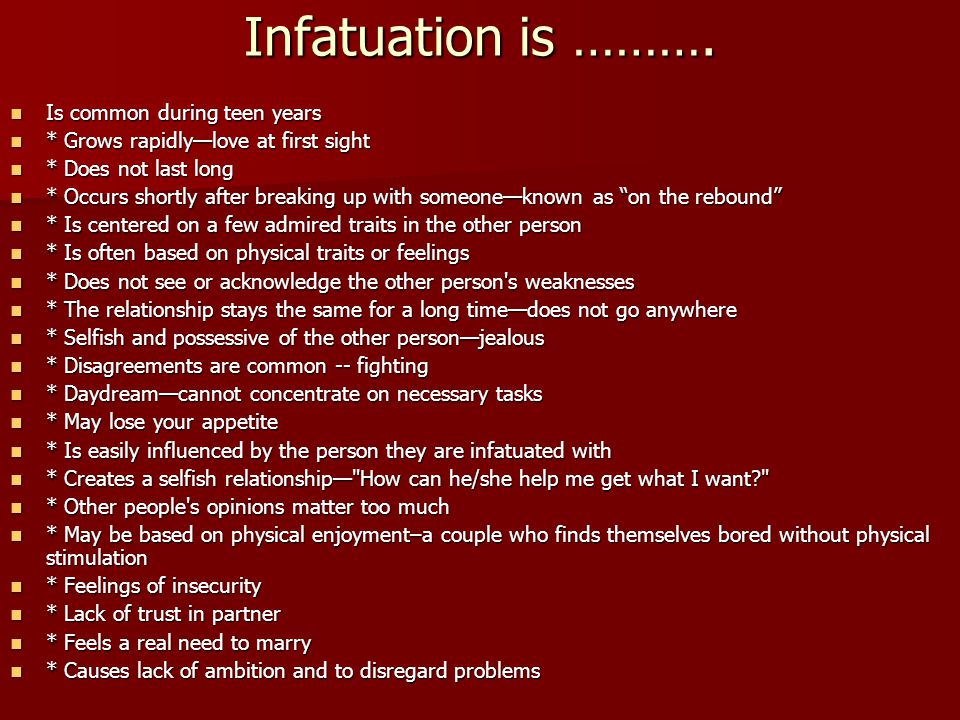
We'll look at 12 of these keys, but first let me point out the following: (1) The order of the keys doesn't matter. Each of them has the same meaning as the others. (2) These keys should not be randomly accepted. You must take into account all 12! nine0160
Key number 1 What attracts you the most.
Passion: When you are infatuated, you are likely to be more interested in the other person's physique. A beautiful face and a good figure are, of course, very attractive qualities, but appearances can be deceiving. It is like wrapping paper wrapped around a gift. It cannot be used to judge what is inside. Moreover, physical beauty is not eternal. Dr. Short says, "Of the dozen school meetings I attended as a young man, I remember only one. "Young people! said the speaker solemnly. - Before marrying a girl because of her pretty face and attractive curves, think about how she will look at 30. "And that stopped me"? nine0005
True love: If your love is genuine, you will be interested in the personality of your chosen one in general. Surely, physical attraction will also be present in your feelings, but only along with many other attractive qualities for you.
Surely, physical attraction will also be present in your feelings, but only along with many other attractive qualities for you.
Key #2 How many different qualities attract you in this person?
Passion: Usually the number of such qualities is small, but they can influence you very strongly. A guy can go crazy with his girlfriend's smiles or sexy walks. nine0005
True love: When you truly love, you like all or most of the qualities in the other person. Each of us has many characteristics, judgments and attitudes. How many characteristics do you notice in the other, and how many of them do you find attractive? This is important because once the initial excitement after marriage wears off, you'll need a lot of common interests to keep the marriage going and make it a success.
Key #3 How did it start?
Passion: Passion arises quickly. There is no true love at first sight, but passion at first sight can flare up.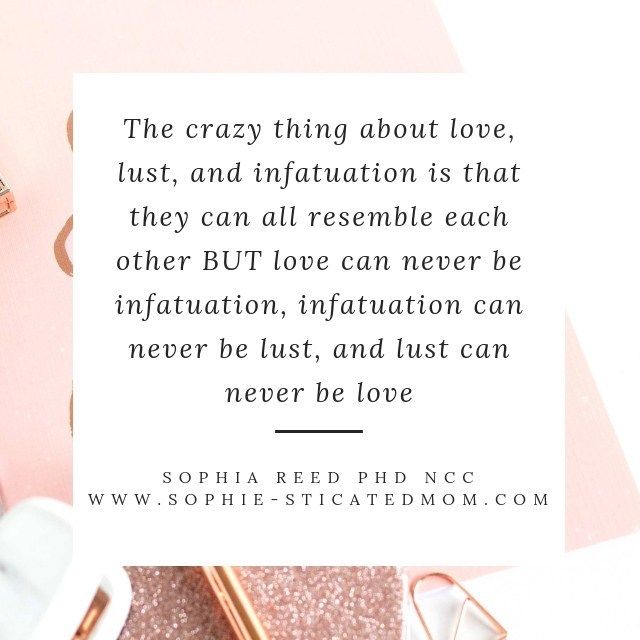 As one love song says, "the eyes of the lovers met in the crowd, lightning flashed, and they immediately realized that they were made for each other." In reality, they could only understand that they made a good first impression on each other.
As one love song says, "the eyes of the lovers met in the crowd, lightning flashed, and they immediately realized that they were made for each other." In reality, they could only understand that they made a good first impression on each other.
True love: True love always comes slowly. Otherwise it can not be. You have to get to know a person before you can really love them, and that takes time, a lot of time, to really get to know someone. A long courtship is much better than a short one. A year is better than half a year, two years is better than one, three years is better than two, and four is better than three. Three years? Four? Yes, the statistics on this subject are absolutely clear. But most young couples do not want to wait even a year. They are in a hurry to get married and, from their own experience, are convinced of the validity of the old saying: "Hurry up - you will make people laugh." If you, on your own head, marry too hastily, then you will have enough time later to regret it. nine0189
Key #4 How stable is your interest?
Passion: When you are passionate, your interest flickers and then fades. One of the reasons for this is that infatuation arises too quickly, and therefore its roots are not deep. And in general, your relationship is superficial.
True love: When you truly love, your feelings will be warm and tender rather than fluctuating from passionate passion to cold indifference, they will be more permanent. True love grows slowly, but its roots are deep. nine0005
Key #5 How does feeling affect you?
Passion: Passion has a disorganizing effect on your personality. Makes you less responsible and efficient. Romantic feelings completely take over you, and you walk, immersed in dreams. The girl who says "I know he has flaws, but nothing matters but our love" is infatuated... TEMPORARY! When she gets married, she will eventually discover that a lot more matters. nine0005
True love: If your love is genuine, your best qualities will come out and you will strive to become even better. A guy who really loves says about his girlfriend: "I love her not only because she is so beautiful, but also because she inspires me to show my best qualities."
Key #6 How do you treat others?
Passion: When you are carried away, for you the whole "universe" revolves around one person. The rest of the relationship seems completely unimportant to you. You are even ready to reject relatives and friends. Your feeling becomes the most important thing in your life. It's the only thing that matters to you from now on. You think that for the sake of this delightful "love" that has entered your life, you are forgiven for doing any actions. As we said before, most passions are short-lived, but the mistakes you make while under the influence of this feeling often have lifelong consequences. nine0005
True love: When you really love, your loved one is the most important person in the world for you, but relationships with family and friends do not lose their meaning.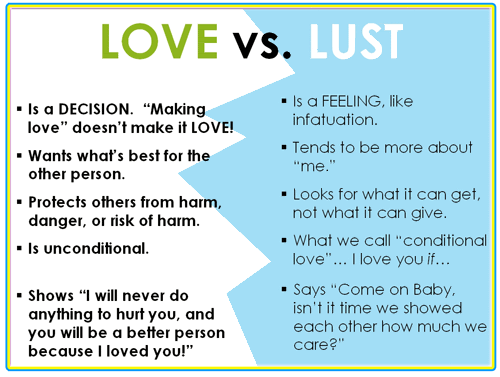
Key #7 How do others view your relationship?
Passion: What others think of your "lover" is a very important test. When you are infatuated, it is likely that your parents and many of your friends will not approve of this relationship. One of the dangers of infatuation is that you tend to idolize the other person. You do not see the flaws, because "blinded by love." Your friends try to point out some danger signs, but you ignore them. Your parents lovingly warn you, trying to prevent you from making a big mistake, but you don't listen. Young people sometimes say: "So what? We marry each other, and not relatives and friends." You, too, can take this position, but it is unforgivable stupidity - to neglect the advice of people who love you. Over the years of life, both you and your loved one have developed a certain circle of friends. We all strive to be like those we choose as friends, they become like us. Therefore, your friends are, in a sense, your "mirror".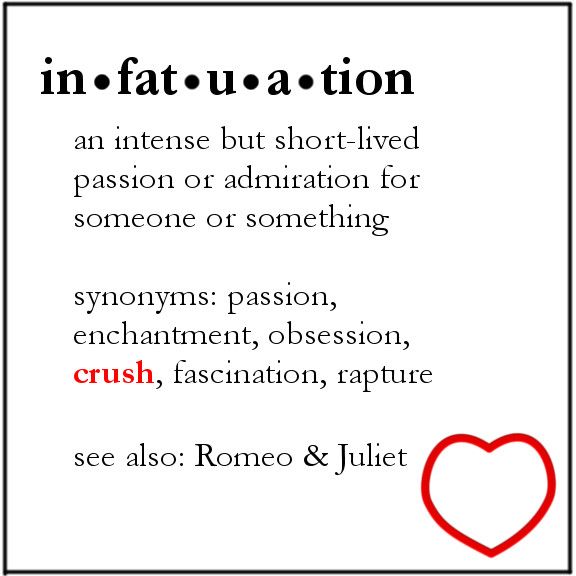 If you are infatuated with someone, friends often do not share such feelings. If they see dangerous signals, you should pay attention to this and listen to their opinion. nine0005
If you are infatuated with someone, friends often do not share such feelings. If they see dangerous signals, you should pay attention to this and listen to their opinion. nine0005
True love: When you truly love, your parents and most of your friends are more likely to approve of your choice. For God to bless your marriage, the consent and approval of your parents is very important.
Key #8 How do breakups affect?
Passion: One of the best tests for feeling is the test of distance. If you're just infatuated, then time and distance will kill your feeling, 'This explains the breakups of those couples whose main interest was physical attractiveness. Over time, another living person nearby will replace the loved one who remains only in the photograph. nine0005
True love: When you really love, the absence of a loved one only exacerbates your feeling. True love will surely stand the test of distance and time. It is based not only on the physical attractiveness of a person, it accepts him as a whole, as a person. Time spent together helps you "grow together". Therefore, when you part, you seem to lose your part. Another person, even a very attractive one, cannot fill the void in your heart. Being at a distance, of course, you can experience anxiety and sadness. You will be disturbed by the thought: "What if he (or she) meets someone else?" And this can happen. But if your loved one is able to find happiness with someone else, then it is better to find out about this before, and not after marriage. Therefore, if you have to part, put up with it and do not worry. If your feeling is only infatuation and it won't stand up to such a test, it's best to find out before it's too late. nine0005
It is based not only on the physical attractiveness of a person, it accepts him as a whole, as a person. Time spent together helps you "grow together". Therefore, when you part, you seem to lose your part. Another person, even a very attractive one, cannot fill the void in your heart. Being at a distance, of course, you can experience anxiety and sadness. You will be disturbed by the thought: "What if he (or she) meets someone else?" And this can happen. But if your loved one is able to find happiness with someone else, then it is better to find out about this before, and not after marriage. Therefore, if you have to part, put up with it and do not worry. If your feeling is only infatuation and it won't stand up to such a test, it's best to find out before it's too late. nine0005
Key number 9 How do disagreements affect feelings?
Passion: When you are in love, you often quarrel. You can put up, but over time, quarrels become more frequent and serious.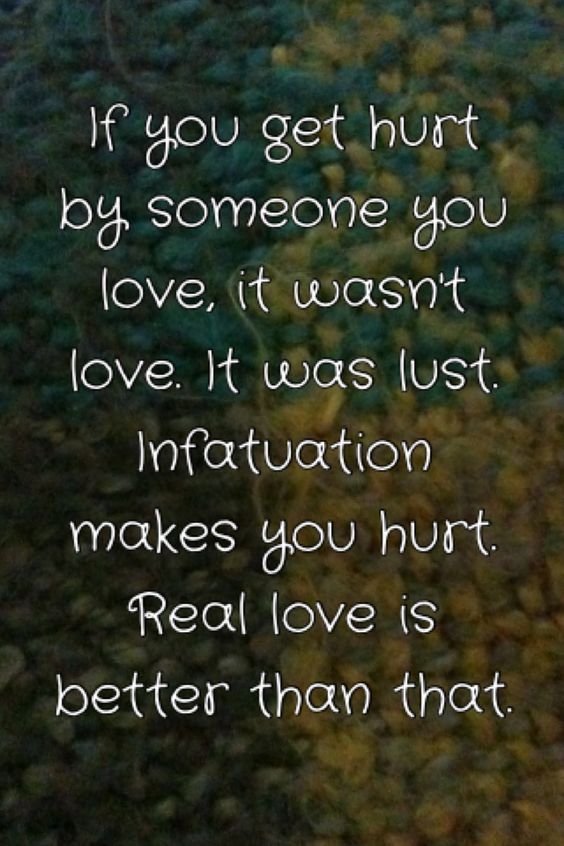 You become like. two porcupines in the cold. When they are apart, they shiver from the cold, but as soon as they snuggle up to each other, they prick each other with their needles. "Phil and Alice met for more than two years. During this time they quarreled and reconciled at least once a month. Disagreements arose because of any trifle or imaginary insult. Both played out terrible jealousy. And then Maria, Alice's best friend, tried to open them Once Alice shared with her the details of the last quarrel and threatened: “Let him just try to get me back! I won't even talk to him!" "I think you will, Alice," Maria said softly to her, "but I hope you tell him firmly: "Goodbye, Phil, it's over." And then she explained her position to a surprised friend: “You both bring out the worst in each other. You quarrel because you have nothing else to talk about. Discord, tears and romantic “reconciliation” only relieve you of boredom.
You become like. two porcupines in the cold. When they are apart, they shiver from the cold, but as soon as they snuggle up to each other, they prick each other with their needles. "Phil and Alice met for more than two years. During this time they quarreled and reconciled at least once a month. Disagreements arose because of any trifle or imaginary insult. Both played out terrible jealousy. And then Maria, Alice's best friend, tried to open them Once Alice shared with her the details of the last quarrel and threatened: “Let him just try to get me back! I won't even talk to him!" "I think you will, Alice," Maria said softly to her, "but I hope you tell him firmly: "Goodbye, Phil, it's over." And then she explained her position to a surprised friend: “You both bring out the worst in each other. You quarrel because you have nothing else to talk about. Discord, tears and romantic “reconciliation” only relieve you of boredom.
True love: When you are truly in love, there may be disagreements, but true love survives them, and quarrels become less frequent and serious.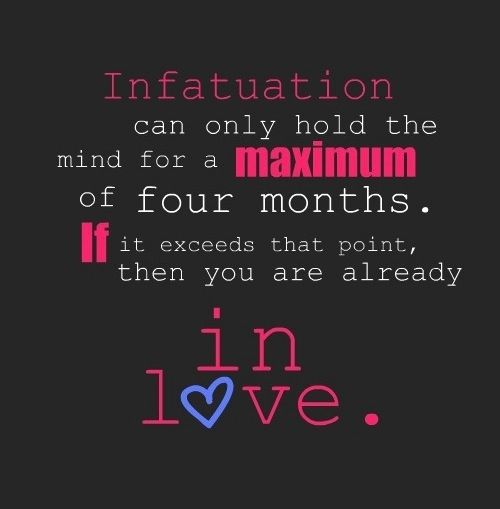 Every couple must learn to resolve conflicts. It is much better to discuss disagreements openly and honestly than to let them smolder in the back of your mind.
Every couple must learn to resolve conflicts. It is much better to discuss disagreements openly and honestly than to let them smolder in the back of your mind.
Key #10 How do you view your relationship?
Infatuation: When you are infatuated, you tend to think of yourself and your loved one as two people, and accordingly use pronouns in your thoughts and speech: "I", "me", " mine", "he", "his", or "she", "her". You think of you as two separate individuals. nine0005
True love: When you really love, you usually use the words: "we", "our", "us". You think of you as one. This key doesn't seem to be as important when you're just dating, but it's hugely important in a marriage. When a marriage is based on passion, a husband and wife may find more pleasure in pursuing different interests than in working together. A husband may want to "go out with friends" more than spend time at home with his family. Or the wife will become more interested in her social connections than in household chores. In families where true love exists, husband and wife enjoy doing things together. A common answer here is: "I don't want to go if you can't go too." nine0005
Or the wife will become more interested in her social connections than in household chores. In families where true love exists, husband and wife enjoy doing things together. A common answer here is: "I don't want to go if you can't go too." nine0005
Key #11 Are you selfish or selfless?
Infatuation: When you are infatuated, your interest in the other person is mostly selfish. A guy can meet a beautiful and noticeable girl, just because it flatters his pride, raises his prestige. She can be capricious and spoiled, but since she is the "queen" of the school, he becomes the "king" next to her. In the same way, a girl can keep a guy "on a leash" not because she is really interested in him, but because his devotion raises her price in the eyes of others. nine0005
True love: When you really love, you like a person for who he is, not because he can help you assert yourself.
Key #12 What is the basis of your feelings?
Passion: Is your goal to find a person who will devote his whole life to making you happy? Are you taking care of yourself first? If so, then you're just infatuated. Your overall stance is selfish - you care most about what you can get out of this relationship. nine0005
Your overall stance is selfish - you care most about what you can get out of this relationship. nine0005
True love: Love is unselfish and devoted. You strive to do everything possible to bring joy to another. You are primarily interested in what you can give, not receive.
* * *
Assess your feeling. Take a sheet of paper and carefully study the keys, starting with the first one. Give each of them an assessment of your feelings. If you want, the keys can show not only whether your love is real, but also a certain degree of your feelings. In most cases, the keys show a mixture of infatuation and true love. Therefore, evaluate each key on a ten-point scale. Zero would mean infatuation, and 10 would mean love. For example, looking at Key #1, you might decide, "To be perfectly honest, I was mainly interested in physical attractiveness, so I'll give myself two points." If, when examining key #7, you see that about half of your friends approve of your choice, and half do not, then give yourself five points.